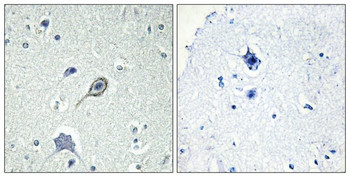Description
Goat Anti-Mouse IgG Antibody, F(ab′)2, FITC conjugate, 1mL
1 mg/mL, Chemicon®
eCl@ss:
32160702
NACRES:
NA.46
PROPERTIES
biological source
goat
Quality Level
100
conjugate
FITC conjugate
antibody form
F(ab′)2 fragment of affinity isolated antibody
antibody product type
secondary antibodies
clone
polyclonal
species reactivity
mouse
manufacturer/tradename
Chemicon®
concentration
1 mg/mL
technique(s)
immunofluorescence: suitable
shipped in
wet ice
target post-translational modification
unmodified
DESCRIPTION
General description
Immunoglobulin G (IgG), is one of the most abundant proteins in human serum with normal levels between 8-17 mg/mL in adult blood. IgG is important for our defence against microorganisms and the molecules are produced by B lymphocytes as a part of our adaptive immune response. The IgG molecule has two separate functions; to bind to the pathogen that elicited the response and to recruit other cells and molecules to destroy the antigen. The variability of the IgG pool is generated by somatic recombination and the number of specificities in an individual at a given time point is estimated to be 1011 variants.
The reagent is an anti-mouse antibody F(ab′)2 fragment from goat. The F(ab′)2 fragments are obtained by pepsin cleavage. The fragments are conjugated to fluorescein isothiocyanate and stabilized in buffer. The molar ratio of fluorescein: protein is: 3 - 7.
PURIFICATION: The goat-lgG was purified by affinity chromatography and absorbed to remove cross-reactivity to human immunoglobulins.
PURIFICATION: The goat-lgG was purified by affinity chromatography and absorbed to remove cross-reactivity to human immunoglobulins.
Specificity
Specific for mouse IgG, heavy and light chain. The cross-reactivities of the anti-mouse IgG antibody were tested in an ELISA. Minimum cross-reactivity to human IgG.
Application
Immunohistochemistry: 1:200-1:500 (Coligan et al. 1997; Harlow & Lane 1988; Bullock & Petrusz 1982; Javois 1994)
Immunocytochemistry: 1:200-1:500 (Coligan et al. 1997; Harlow & Lane 1988; Bullock & Petrusz 1982; Javois 1994)
Flow cytometery: 1 μg per 1 x 10E6 cells (Coligan et al. 1997; Harlow & Lane 1988; Javois 1994) FITC absorption peak is 488-492nm, its emission peak is 520nm.
Optimal working dilutions must be determined by the end user.
Immunocytochemistry: 1:200-1:500 (Coligan et al. 1997; Harlow & Lane 1988; Bullock & Petrusz 1982; Javois 1994)
Flow cytometery: 1 μg per 1 x 10E6 cells (Coligan et al. 1997; Harlow & Lane 1988; Javois 1994) FITC absorption peak is 488-492nm, its emission peak is 520nm.
Optimal working dilutions must be determined by the end user.
Research Category
Secondary & Control Antibodies
Secondary & Control Antibodies
Research Sub Category
Fragment Specific Secondary Antibodies
Fragment Specific Secondary Antibodies
This Goat anti-Mouse IgG Antibody, F(ab′)2, FITC conjugate is validated for use in IF for the detection of Mouse IgG.
Physical form
ImmunoAffinity Purified
Liquid in 0.02M Phosphate Buffer. 0.25 M NaCl, pH 7.6 with 15 mg/mL BSA and 0.01% Sodium azide.
Storage and Stability
The antibody conjugate solution is stable at 2–8°C for 12 months. Do not store in a diluted format.
Legal Information
CHEMICON is a registered trademark of Merck KGaA, Darmstadt, Germany
Disclaimer
Unless otherwise stated in our catalog or other company documentation accompanying the product(s), our products are intended for research use only and are not to be used for any other purpose, which includes but is not limited to, unauthorized commercial uses, in vitro diagnostic uses, ex vivo or in vivo therapeutic uses or any type of consumption or application to humans or animals.
SAFETY INFORMATION
Storage Class Code
12 - Non Combustible Liquids
WGK
WGK 2
Flash Point(F)
Not applicable
Flash Point(C)
Not applicable








